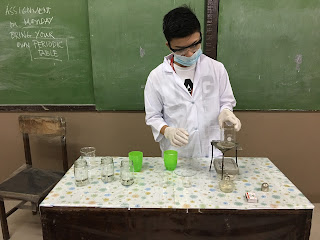A. Guide Questions
1.
a. What topic/project do you want to work on?
b. Is it meant to solve a problem? explain
a phenomenon? produce a new gadget? produce a new product?
c. Specifically what questions will your study answer?
c. Specifically what questions will your study answer?
2. a. What necessary information about your
topic or problem is available in reference books?
b. What studies similar to yours have been conducted before? What were the findings of those studies?
c. How does your study differ from each of them?
b. What studies similar to yours have been conducted before? What were the findings of those studies?
c. How does your study differ from each of them?
3.
a. If your study aims to explain a certain phenomenon, what is the possible
explanation.
b. If your study aims to solve a problem,
what is a possible solution? (this is your hypothesis)
4.
a. How will you test your hypothesis? To answer this question, design an
experiment to test the hypothesis.
b. What data or information do you need to
collect from your experiment to be able to judge if your hypothesis is correct
or not?
5.
a. What are the best ways of presenting the data that you will gather from the
experiment?
b. How will you analyze and interpret the
data?
6.
What generalizations can be drawn from your data?
7.
Is your study relevant to life? If so, how will you apply your findings in
life? Think of a possible application of your findings.
B. Outline and
Guide Questions
I. INTRODUCTION
A. Background of
the Study
Why
did you conduct the study?
B. Statement of the
Problem
1.
What topic/problem did you study?
2.
What specific questions did your study answer?
C. Significance of
the Study
1.
Who will benefit from your study?
2.
How will they benefit?
D. Scope and
Limitations of the Study
1.
What aspects of the topic were covered by your study?
2.
How long did you conduct the study?
II. REVIEW OF
LITERATURE and CONCEPTUAL FRAME WORK
A. Review of
Literature
1.
What information about your topic/problem is available in reference materials?
2.
What findings from earlier research are relevant to your topic/problem?
B. Conceptual
Framework
1.
Can you describe how the key variables in your study are related?
2.
Can you show that in the form of a diagram?
C. Hypothesis
What
specific relationship do you believe exists between every two variables in your
conceptual framework (in Part II B above)? The relationship could be a possible
explanation of a phenomenon or a possible solution to a problem.
D. Definition of
Terms
How
should technical terms in your study be interpreted?
III. METHODOLOGY
A.
1. Can you describe the plan or design of the experiment?
2. What is the experimental variable? the
control?
B.
1. Can you describe the sample or the organisms that you worked with?
2. How did you gather them?
C.
How did you collect, organize and record the experimental data?
D.
How did you analyze and interpret the data?
IV. RESULTS and
FINDINGS
A.
How did you present the data? What graphics (e.g. tables, graphs, diagrams) did
you use to facilitate understanding of the data?
B.
What do the data imply?
V. SUMMARY,
CONCLUSIONS, and RECOMMENDATIONS
A.
Why is it necessary to have a brief summary of Parts 1 to IV at this point?
What is the advantage of having a subsection entitled Summary of Findings in
the form of a list or enumeration?
B.
Do the conclusions answer each of the research problems and questions in Parts
1 and II in the previous page?
SOME REMINDERS TO
STUDENT-RESEARCHERS
1. Know the important properties of all the
reagents or materials you will use. If any of these materials has harmful
properties, seek appropriate supervision. And find out how to safely dispose of
all materials after you finish your experiments.
2. Learn how to use safely and properly all
the equipment and instruments you will use. Remember that improper use of
equipment will affect the accuracy of the experimental results and may even be
dangerous, considering that scientific instruments are generally fragile.
3. Make sure you thoroughly understand all
procedures to be used before you begin your experiment. Go through several
trial runs, not only for practice, but also to find out if there will be any
need to modify the procedure or replace a material or instrument.
4. Decide how you will collect and record
your data before you begin your study. It is preferable to:
4.1 record all the information, observation
or data in one notebook, NOT on loose slips of paper, so that you will not lose
any of the data; and
4.2 write down your observations as soon as
you make them. If possible, construct tables, etc. which you can just fill in
as you conduct your investigation.



No comments:
Post a Comment